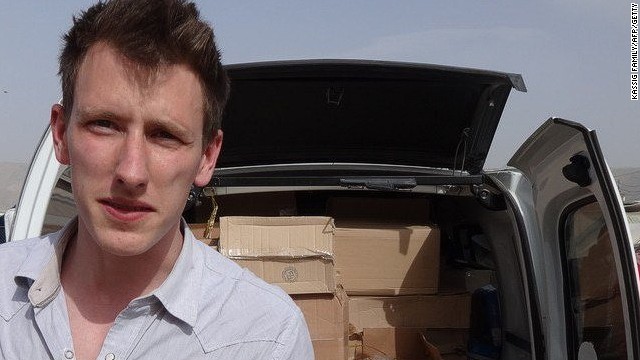Editor's note: Fawaz A.
Gerges holds the Emirates Chair in Contemporary Middle Eastern Studies
at the London School of Economics and Political Science. He is author of
several books, including "The New Middle East: Social Protest and
Revolution in the Arab World.
" The views expressed in this commentary
are entirely his own.
(CNN) -- The beheading of American aid worker Peter
Kassig by ISIS is an act of cruelty, but it's also an act of desperation
by a terrorist organization that has found itself on the run.
None of us, sadly, can be
surprised anymore at the brutality of ISIS, the insidious group that
now controls huge chunks of territory in Syria and Iraq. But Kassig's
murder also reveals how little regard the so-called "Islamic State" has
for Islamic values.
Moderate and radical
Islamic clerics alike had called for ISIS to spare the life of Kassig --
also known as Abdul-Rahman -- a former U.S. Army Ranger who toured Iraq
in 2007 and converted to Islam during his year in captivity.

Fawaz Gerges
Killing a convert to
Islam is an extremely serious violation of the well-established
consensus in the Islamic community on the sacredness of life for
converts to the religion.
Abu Muhammed al-Maqdsi, a
mentor to many al Qaeda leaders, had called for mercy -- not only
because Kassig was a convert to Islam, but because he had given up so
much to move to Syria and help victims of the war. Militant Islamists in
the country also went public with a request for mercy. They said
Kassig, a trained medic, had treated them when they were injured in
battles against Syrian government forces.
It was inevitable that
these calls would fall on deaf ears. Beheading Western hostages is one
of the only tools ISIS has at its disposal to retaliate against the
American-led airstrikes that are beginning to land serious blows on the
group. Hundreds of fighters have been killed by airstrikes in Iraq and
Syria, particularly around the Syrian town of Kobani, and Iraqi troops have also made a series of advances.
It took the Americans
about two months to build up a critical mass of intelligence -- what
U.S. military officials call "patterns of life" -- about the behaviors
and organization of ISIS, but in the last few weeks that critical work
has begun to bear fruit.
On November 7, American warplanes bombed a convoy of vehicles near Mosul,
in northern Iraq. The airstrikes were conducted against what was
assessed to be a meeting of ISIS leaders near the town. Unconfirmed
reports suggested that a number of top commanders -- including ISIS
chief Abu Bakr al-Baghdadi -- could have been injured in the attack.
While it is difficult to
keep track of the latest developments on the ground, what we do know is
this: The momentum, at least in Iraq, is shifting. The group's leaders
are being hunted down, and they're feeling the pain.
In July, a video emerged of a defiant Baghdadi delivering a sermon at a mosque in Mosul. Last week, ISIS released an audio clip
of a man purporting to be Baghdadi -- a sign that, like al Qaeda's
leaders before them, ISIS bosses are going deeper and deeper
underground.
ISIS' surge has been
blunted by U.S. airstrikes. The days when the group could sweep into a
town and take it over seem long gone. The Iraqi army along with its
allies -- the Kurds and the Shia militias -- have made good progress in
the past two months, retaking Baiji and other strategic towns in Iraq.
The nation's military is being restructured and rebuilt, and the Iraqi
state is beginning to stand on its own two feet.
The terror group's
success up until now has been based on its ability to sell its narrative
to poor local Sunni communities. ISIS has portrayed itself as the
defender of persecuted Sunnis against sectarian Shia-led governments in
Iraq and Syria and elsewhere, and embedded itself into the communities
of cities like Mosul, Tikrit and Fallujah.
This narrative brought
thousands of Sunnis together to fight the Shia under ISIS' banner, even
though these tribes didn't subscribe to the group's extremist ideology.
But more and more Sunnis are beginning to realize that ISIS isn't their
friend. In fact Muslims, have until now borne the brunt of ISIS'
brutality. The group has killed thousands of Shias and Sunnis are also
being targeted.
In August, ISIS fighters massacred 700 members of the Sunni Shaitat tribe in eastern Syria, according to the Washington Post. In early November, ISIS murdered hundreds of members of the Albu Nimr tribe,
a powerful Sunni clan in Anbar province, west of Baghdad. Today, more
and more Sunni tribes are beginning to organize themselves in opposition
to ISIS' bloody reign.
The battle for Kobani
could now prove to be the turning point. ISIS has made a last stand of
sorts in this small Kurdish town on Syria's border with Turkey. The
group wanted to send a message to the world that not only could it
defeat local opposition, it could defeat the Americans. That mission has
failed, and it was a monstrous strategic error.
ISIS poured thousands of
skilled fighters into Kobani. We have evidence that many of them never
returned, and that ISIS has forced local policemen to join their ranks.
But the heroic will of
the Kurdish defense forces in Kobani have broken the group's will -- and
most significantly, they have shattered ISIS' narrative of
invincibility.
Kobani has shown that
ISIS can be defeated. ISIS has been stopped in its tracks. The group is
bleeding and the beheading of Kassig shows ISIS' desperation to lash
out, to show that it still has options.
Is the battle over? Of
course not. It will be long, it will be costly, it will be risky, and it
will last for years -- perhaps even a decade. This is an army of tens
of thousands of skilled, fanatical soldiers who are willing to kill and
be killed. The voice (purported to be Baghdadi's) on last week's recording declared: "They will never abandon fighting ... They will be triumphant even if only one man of them is left."
The top-down approach of
airstrikes and ground forces won't rid the Middle East of ISIS'
insidious ideology. This is not about winning one or two battles -- it's
about dismantling Baghdadi's killing machine from the ground up. The
group can only be defeated when its sectarian narrative about the
persecution of Sunnis is dismantled.
We need a bottom-up
approach that addresses the legitimate grievances of poor Sunni
communities in Iraq and Syria, and gives them a stake in their political
future. We need a political solution to the civil war in Syria that has
provided ISIS with motivation, funding, and thousands of skilled
soldiers. And we need to put an end to the proxy war being waged in
these countries by the Sunni rulers of Saudi Arabia and the Shia regime
in Iran.
Given the complexity of
the situation, this is all easier said than done. The latest
developments have shown that ISIS is not invincible -- but to defeat the
group, military cooperation without true political consensus on how to
end the crisis will not be enough.

No comments:
Post a Comment